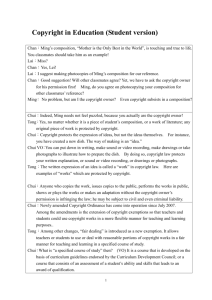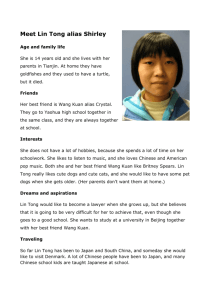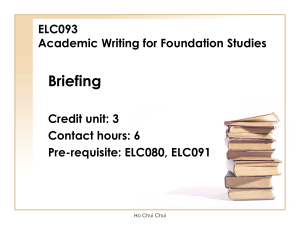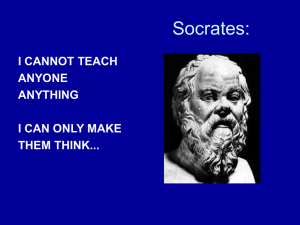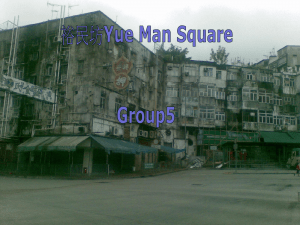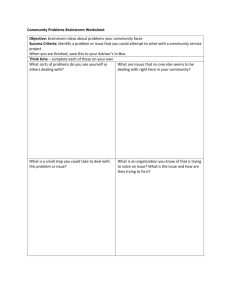Video Transcript
advertisement
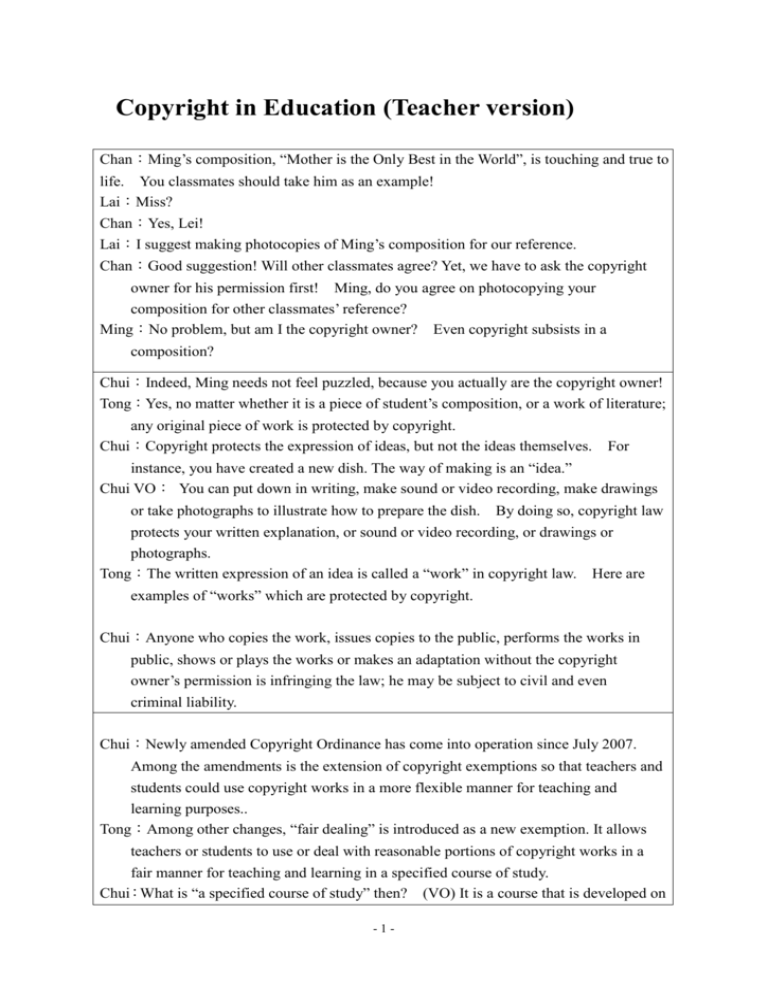
Copyright in Education (Teacher version) Chan:Ming’s composition, “Mother is the Only Best in the World”, is touching and true to life. You classmates should take him as an example! Lai:Miss? Chan:Yes, Lei! Lai:I suggest making photocopies of Ming’s composition for our reference. Chan:Good suggestion! Will other classmates agree? Yet, we have to ask the copyright owner for his permission first! Ming, do you agree on photocopying your composition for other classmates’ reference? Ming:No problem, but am I the copyright owner? Even copyright subsists in a composition? Chui:Indeed, Ming needs not feel puzzled, because you actually are the copyright owner! Tong:Yes, no matter whether it is a piece of student’s composition, or a work of literature; any original piece of work is protected by copyright. Chui:Copyright protects the expression of ideas, but not the ideas themselves. For instance, you have created a new dish. The way of making is an “idea.” Chui VO: You can put down in writing, make sound or video recording, make drawings or take photographs to illustrate how to prepare the dish. By doing so, copyright law protects your written explanation, or sound or video recording, or drawings or photographs. Tong:The written expression of an idea is called a “work” in copyright law. Here are examples of “works” which are protected by copyright. Chui:Anyone who copies the work, issues copies to the public, performs the works in public, shows or plays the works or makes an adaptation without the copyright owner’s permission is infringing the law; he may be subject to civil and even criminal liability. Chui:Newly amended Copyright Ordinance has come into operation since July 2007. Among the amendments is the extension of copyright exemptions so that teachers and students could use copyright works in a more flexible manner for teaching and learning purposes.. Tong:Among other changes, “fair dealing” is introduced as a new exemption. It allows teachers or students to use or deal with reasonable portions of copyright works in a fair manner for teaching and learning in a specified course of study. Chui:What is “a specified course of study” then? (VO) It is a course that is developed on -1- the basis of curriculum guidelines endorsed by the Curriculum Development Council; or a course that consists of an assessment of a student’s ability and skills that leads to an award of qualification. Tong VO:To decide whether an act of dealing is “fair” or not, the factors you need to consider include: the purpose and nature of the dealing, including whether such dealing is for non-profit making purpose or of a commercial nature; the nature of the work; the amount and substantiality of the portion dealt with in relation to the work as a whole; and the effect of the dealing on the potential market for or value of the work. Chan:Mr. Leung, which film is it? It looks very familiar! Leung:Yes, this is a documentary called “Hong Kong Today”! I plan to play it during the Liberal Studies Class later for illustrating some key points. Chan:I have watched this documentary before! Let me see which episode you have chosen. Chan:The content of the film seems to have been adapted? Leung:Yes, I do know some basics. You know how to edit a film? Chan:Can you teach me how to do it? Leung:Yes. Firstly, you need to use a converter software to convert the contents from a genuine DVD into computer video file. Then, use an editing software to take out the footages you need and edit. It is actually very simple, and I can lend you a book for your learning.. Chan:Sure, thanks! Tong:Doesn’t converting DVD contents into computer file and editing infringe copyright? Chui:It depends on whether Mr. Leung fulfilled the requirements of “fair dealing”or not. Chui VO:Converting the video format from DVD to computer file is in fact the same as copying a copyright work once and this is a restricted act in copyright. Chui:However, Mr. Leung did this merely for teaching purposes. The amount and substantiality of the portion dealt with in the edited version was small. The effect it had on the potential value of the work should be very mild. As long as Mr. Leung had acknowledged the title of the film, the producer and the principal director in the teaching material, and taking into account of the factors of “fair dealing”, Mr. Leung’s act might not constitute copyright infringement. -2- Tong:“Fair dealing” exemption applies also to students. For instance, a student copies a small portion of a copyright work for illustration. Considering the aforesaid principles, if the circumstances favour a finding of “fair dealing”, the student’s act would not be regarded as infringement. Tong VO:Then in what situation would it be considered not “fair?” For example, a teacher plays a DVD movie in class for students’ entertainment after exams were over. It is not “fair dealing” because the teacher is not using it for educational purpose. Tong VO:Also, if a student copies the whole or a large portion of a textbook for his own use just because he believes the textbook is too expensive, this is not “fair dealing”. The reason is that the amount is too great and the market for the book is adversely affected. Chui:The amended Ordinance also specifically addresses the issue of placing copyright works on an Intranet. Tong:Yes! School Intranet plays a very important role in students’ learning. Besides daily lessons, students can acquire further knowledge from the Intranet that facilitates their self- learning. Chui:However, when a school wants to make available copies of a copyright work through its Intranet for teaching purpose, they must satisfy the following two requirements: Chui VO:Firstly, they must adopt appropriate security measures, such as requiring login username and password, so that access to the work would be restricted to the users who need to use it for teaching or learning in their studies and persons who need to maintain or manage the network; Wong:Please upload this powerpoint file onto the Intranet for me. Chui VO:Secondly, they must ensure that the work is only stored for a period of time which is just long enough for the intended teaching purpose. months is the maximum duration allowed. In any event, 12 Yan:Ching Ching! Ching:Yes? Yan:I know Mr. Leung played a very interesting video clip in higher Form’s Liberal Studies Class and I really want to watch it! Ching:You can go to our school Intranet for viewing it. Yan:I am not allowed to have access to the teaching materials of classes in higher Form, so could you give me your username and password instead? Ching:Password is very personal information. How can I give it to you? -3- Yan:How about having it downloaded and forwarded to me by email? Ching: Hmmm… Tong:As Intranet password is personal information, we really should not pass it around, nor can we freely download information or make copies from Intranet for others. Chui:So teachers, remember to make this clear to your students! Ming:Mr. Leung, here is our project and the title is “Did Zheng He discover the New World earlier than Columbus?” Ming:And our conclusion is that the theory of Zheng He’s discovering the New World is not supported by any solid evidence. Lai:For instance, the conclusion of this research report in my hands challenges the argument of Zheng He’s discovering the New World. Leung:How did you get this article? Yan:This article came from a research report. The report has more than a hundred pages, so we just took the chapter of conclusion as the conclusion of our project. Leung:Hmmm… Tong:Did the students infringe copyright? Chui:To determine whether it is “fair dealing” or not, one of the considerations is the amount and substantiality of the portion being dealt with. (VO)In the case, the conclusion was the most essential part of the research report. Although the number of pages was not large, in relation to the whole work, the portion dealt with was highly essential. In another perspective, the students did not add any of their own views into the project at all, and their dealing with the report was solely for the purpose of copying! Tong:Having considered all the circumstances, the students did not fairly deal with the copyright work, thus infringing others’copyright. Chui:As the circumstances of dealing with a copyright work vary from case to case when using the copyright work, we need to consider all the circumstances in order to decide whether the act of dealing with the work is “fair”, so as to avoid copyright infringement. Tong:So besides the principles of “fair dealing” that we just discussed, in fact, the Copyright Ordinance has another provision which concerns reprographic copying. Chui:Yes, the newly amended Ordinance now allows not only teachers but alos students to make reprographic copies of literary, dramatic, artistic or musical works to a -4- reasonable extent for teaching and learning purposes in a specified course of study, for examples by scanning and photocopying a work. Tong:However, if there is a licensing scheme authorising the copying in question, the exemption we mentioned before will not be applicable. Chui: In fact, most educational establishments in Hong Kong including subsidised schools, caput schools, government schools, special schools and grant schools have already entered into certain license agreements. Chui:Below are two of the copyright licensing organisations. The teaching staff of the schools which have joined the licensing scheme will be allowed to make copies of printed works in hardcopy form under certain limits according to the terms of agreements.. Tong:On the other hand, not-for-profit educational establishments which have not entered into any license agreement may also photocopy limited portions of printed works for instruction purposes according to these guidelines. Wong:Class, I have finished teaching the book “The Sound of Music”. I plan to spend two weeks to help you practise your English in the form of a drama. On Monday after two weeks from now we will have our final rehearsal. We will also arrange parents to come and observe our classroom teaching. All of you should learn the script by heart and pay attention to your pronunciation! On:Wow, it would be of great fun! Wong:“The Sound of Music” has its own original soundtrack, and we will need to play it during rehearsals. So Lei, would you please get the CD for us? Lai:Sure, no problem! On:Miss Wong! Wong:Yes! On:My parents will not be available for that day. May I ask another one to come? Wong:You could ask your near relatives or guardians to come. On:Could I ask my private tutor to come and observe the classroom teaching? Wong:Eeeeh… Tong:All along, there have been rules in Copyright Ordinance for performances taking place at an educational establishment. Chui:Yes. It permits performance of a literary, dramatic or musical work by teachers or students, or by any other person for teaching purposes. In addition, it also permits an educational establishment to play a sound recording, film, broadcast or cable programme for teaching purposes. -5- Tong:Yet, the amended Ordinance has extended the scope of the audience. The audience can now consist wholly or mainly of teachers, students, parents or guardians of the students and other persons directly connected with the activities of the educational establishment. For example, near relatives of students may accompany the students to attend school activities in the place of their parents or guardians. The audience may also include School Management Committee members. Chui:In the case, since the audience of the performance are mainly teachers, students, parents or guardians of the students, and the tutor whom On wanted to invite was merely a little part of the whole audience, Miss Wong might permit On’s tutor to attend. Tong:However, an educational establishment cannot rely on this exemption if it organises an activity which is open to all the friends and relatives of its students or to the general public. Instead, a license should be obtained in advance for the public performance to take place. Tong:Do you know what are parallel imports? Chui:I know! Yes! Tong:Parallel imported copies of copyright works are genuine copies that are subsequently imported into Hong Kong without the consent of the copyright owner, and are originally made outside Hong Kong. Chui:The amended Ordinance has liberalised the parallel importation of copyright works. Educational establishments, including their libraries, may now import or possess for use parallel imported copies of copyright works without resulting in any liability. For example, if some educational establishments or their libraries import parallel imported movies or musical visual recordings, they are allowed to play the works in school for educational purposes. Tong:However, if an educational establishment use the copies for selling, hiring, or distributing for profit, the abovementioned liberalisation will not be applicable and the education establishment can become liable to civil or even criminal sanctions. Chui:I believe everyone who has watched this video should have more understanding about the amended Copyright Ordinance. (VO) If you want to obtain more information about copyright, you can visit the website of the Intellectual Property Department. Tong:Finally, we hope that all teachers and students will make reasonable and fair use of copyright works in appropriate circumstances. Chui, Tong:Bye Bye! -6-
